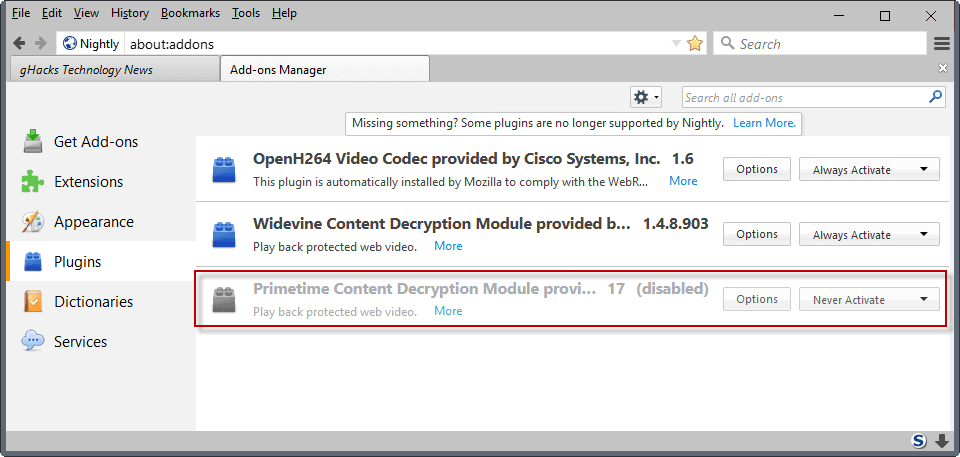Firefox 52: Adobe Primetime CDM removal

Mozilla plans to remove the Adobe Primetime Content Decryption Module in Firefox 52 Stable.
Adobe Primetime is a content decryption module that is only available for Firefox on Windows. It is designed to play back protected media streams. In other words, it is a plugin for DRM.
Firefox did download the Adobe Primetime plugin automatically since its introduction in Firefox 38. This changed only recently -- in Firefox 47 to be precise -- when Mozilla switched the download to on-demand only.
This means hat Adobe Primetime is only downloaded by Firefox when you visit a site that requires it to play back media. The change does not affect existing Adobe Primetime installations.
Firefox 52: Adobe Primetime CDM removal

Starting with Firefox 52, Adobe Primetime will no longer be downloaded at all in Firefox. The browser will be released on March 7, 2017 if the schedule holds.
Mozilla does not mention a reason for the decision in the bug listing. The one that makes sense the most is that the company enabled support for Google's Widevine Content Decryption Module in Firefox recently as well.
Support for Google Widevine was added in Firefox 47 for Windows and Apple versions, and in Firefox 49 for Linux. This means that the content decryption module supports all three major desktop platforms Firefox is offered on.
Mozilla is working on Widevine support for Firefox on Android, and plans to push out a first version soon.
Additionally, and that is probably the main reason for the decision, Widevine is also supported by Google Chrome.
Chrome does not support Adobe Primetime on the other hand, and since it is the browser that is most widely used, sites do favor Widevine support over Primetime support usually.
All major streaming sites should work fine with Google Widevine.
The "other" option that browsers have to stream protected media is through browser plugins. Firefox supports only NPAPI plugins, but support is on its way out as the Web is moving towards HTML5 and away from proprietary solutions.
While Firefox will continue to support Adobe Flash in Firefox 52 and in the foreseeable future, all other plugins will no longer be supported in Firefox 52. This includes Microsoft Silverlight, a plugin used to stream encrypted media in the past.
Firefox 52 is the new ESR version -- Extended Support Release -- of Firefox. It won't support Adobe Primetime CDM anymore just like any regular version of the web browser. (via Sören Hentzschel)
Now You: Do you make use of CDM in Firefox?






















So, Mozilla continues to remove stuff from their browser… What a pity.
it could be googles using webrtc over plugins like for google hangouts so forth the requirement for plugins now just used webrtc and standard drm in browser ?
Martin,
Aha! Excellent. Now I get it. Thank you so much for explaining it to me.
Hi Martin,
I read the article. I don’t understand it. Call me a moron, I don’t mind.
“Adobe Primetime is a content decryption module that is only available for Firefox on Windows. It is designed to play back protected media streams. In other words, it is a plugin for DRM.”
Is there anybody who is willing & able to explain the above paragraph to me in a non decrypted language ? What is a content decryption module, what is playback protected media ? Is this stuff of any importance for the casual user ? I am not criticizing anything, only trying to understand the article.
@ Fritz ……. DRM(= encryption) technology is used by music/video-streaming websites to protect their media contents(= music/videos), which require the websites’ customers to pay subscriptions and/or one-off on-demand payments(eg video-on-demand or sports pay-per-view).
……. These websites may buy n use a proprietary online DRM technology from various companies, eg Google’s Widevine(needs HTML5) or Adobe’s Primetime(needs Flash Player) or M$’s Playready(needs Silverlight) or etc. Web-browsers need to support these DRM technologies in order for the browser-users to be able to watch their paid-for media contents at a particular streaming website, eg for Netflix subscribed videos, the browser needs to support the popular Google’s Widevine DRM technology. Other streaming websites may use other DRM technologies.
.
http(semicolon)//www(dot)howtogeek(dot)com/240636/everything-you-need-to-know-about-watching-drmd-media-on-linux/
I found bbc world service stream (this is free content) is dropping support for flash in 2020 but if my browser does not have Primetime Content Decryption Module plugin the stream it will not play, so the DRM is needed even though your not on a paid subscription. You can test it yourself just disable your flash and DRM plugin (if you have it installed) and see if firefox ESR 52 will stream the content from bbc site at https //www bbc co uk/sounds/play/live:bbc_world_service (fill in colon and blanks manually)
Fritz, videos that companies like Netflix offer are protected, and the browser or program you use to watch these videos needs to support this. For HTML5, which is used by most streaming services and probably all of them in the future, a CDM is required for that.
A CDM is however not needed usually for free videos, e.g. those on YouTube.